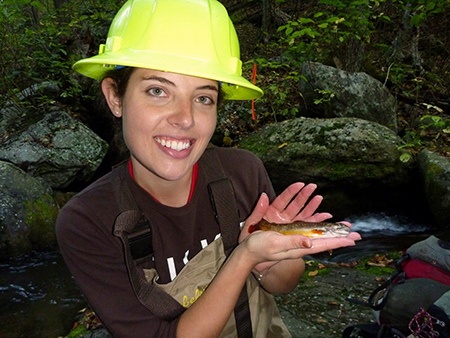Fellow advocates for research to promote sustainable forestry management
Meet Nicole Buell
As a child living near a lake in Raleigh, N.C., Nicole Buell built forts in felled trees. Today she serves as a postgraduate fellow in the USDA Forest Service Research Participation Program (USDA FS RPP) administered by Oak Ridge Institute for Science and Education, which is managed by ORAU for DOE. Based in the USDA Forest Service Research & Development office in Arlington, Va., she is an advocate for research conducted by more than 500 scientists across the country to promote sustainable management of the nation’s diverse forests and rangelands.

Nicole Buell, who holds a master’s in environmental management, spends her time in the USDA Forest Service Research Participation Program creating outreach materials to improve science accessibility.
“I think the USDA Forest Service mission—to sustain the health, diversity and productivity of the nation’s forests and grasslands to meet the needs of present and future generations—is really great,” she said. “Caring for the land and serving people, and the connection between these two goals, is something I think we all feel very strongly about.”
Buell graduated from Duke University with a master’s degree in environmental management. As she watched her graduate school friends filter into various appointment positions managed by ORISE, she discovered that the program description for the USDA FS RPP perfectly fit her interest in blending science and policy.
“All this great science and research exists that really lends itself to improved decision making, but it’s difficult to get it into the hands of those that need it, like land managers, policy-makers, and other decision-makers,” she said. “I am helping to develop mechanisms and tools to share the research and make it more readily accessible through the web, social media, newsletters and other traditional print.”
As a fellow, her responsibility is to affect policy and land management decisions by delivering science effectively through various outreach and communication efforts, including web and briefing pages. During the first half of Buell’s appointment she helped revamp the long-outdated USDA Forest Service Research & Development national website. She considers this public portal a good foundation to draw attention to the USDA Forest Service research and development program, and its efforts to improve the health and use of the nation’s forests and grasslands.
Her specific area of interest is wildlife and fish research. Scientists within this research area investigate and build models on occurrences such as invasive species, global climate change, and habitat loss. The models help answer important questions such as: How does hydropower affect species? What is the value of wildlife in urban spaces? How could energy development affect wildlife? What kind of landscapes do you need to improve wildlife species in an area? Scientists seek answers to these questions with the goal of balancing ecosystem integrity with an increasing human population.
Buell develops information for internal newsletters and press releases for various organizations, agencies, and non-profits to help scientists disseminate their research. “I try to distill it [the research] so the big picture is easy to understand and hopefully, interesting,” she said.
The fellowship has provided her with a gratifying mentorship, numerous travel occasions, and the ability to self-direct. “I’m getting a lot out of it by contributing to very valuable work, and I’m also encouraged to pursue professional development to increase my skill set,” she said. “I think it’s so great to be able to gain experience in the federal government. I don’t think I would have had the same opportunity had this fellowship not existed.”
Katherine Smith, one of Buell’s mentors, said the program immersed Buell in a demanding environment where she quickly developed strong leadership skills. “She’s had a lot of freedom to select projects that address the communication needs and goals of senior scientists in the Washington, D.C. office,” Smith said. “As a result, she has developed a really great network.”
By the time program ends, Buell hopes her contributions will serve as a platform for future science delivery across the agency. “I want to create new mechanisms and traditions of sharing science in different ways that can be replicated across the R & D office and beyond the research that I share specifically,” she said. “For example, my colleagues have begun to publish newsletters to share research with partners, utilize web tracking techniques to figure out which research is most interesting to readers, and translate science into short issue papers for distribution to stakeholders.”

